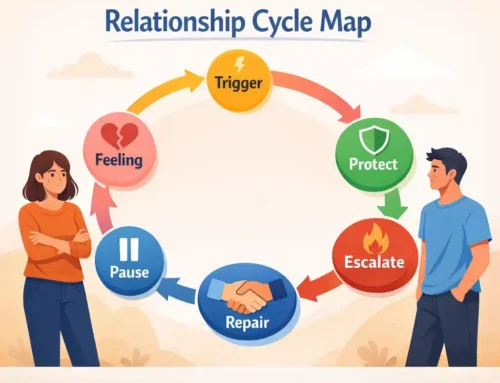
Approx. read time: 4.7 min.
Post: How Your Beliefs Shape Your Feelings and Influence Life Growth
How Beliefs Influence Emotions and Personal GrowthHow Beliefs Influence Emotions and Personal Growth. Our beliefs shape our perception of the world, creating emotions that drive our actions. This connection between beliefs, feelings, and behaviors can either help us grow or keep us stuck in negative patterns. Understanding this dynamic is crucial for personal development and emotional well-being.
The Connection Between Beliefs and Feelings-How Beliefs Influence Emotions and Personal Growth
Beliefs are the mental frameworks through which we interpret reality. They come from past experiences, upbringing, culture, and even self-reflection. When we encounter a situation, our brain processes it based on our existing beliefs, generating emotions accordingly.
For example, if you believe that public speaking is terrifying, your brain will interpret an upcoming speech as a threat, triggering anxiety. On the other hand, if you see it as an opportunity to share knowledge, you’ll feel excited instead.
These emotional responses influence how we act. Someone who feels anxious about speaking might avoid it altogether, reinforcing their fear. Someone who feels excited will practice, improve, and become more confident.
How Negative Beliefs Create Negative Emotions-How Beliefs Influence Emotions and Personal Growth
Negative beliefs often come from past traumas, conditioning, or self-doubt. They distort reality, leading to unnecessary suffering and limiting personal growth. Here are a few ways negative beliefs create negative emotions:
1. Self-Doubt and Fear
Belief: “I’m not good enough.”
Emotion: Fear, anxiety, insecurity.
Outcome: Avoidance, procrastination, or playing small.
People who believe they’re not good enough often feel anxious when facing challenges. This fear leads them to avoid risks, reinforcing their belief and preventing growth.
2. Victim Mentality and Resentment
Belief: “Life is unfair, and I have no control.”
Emotion: Anger, resentment, hopelessness.
Outcome: Blaming others, lack of motivation, stagnation.
When someone believes they’re a victim of circumstances, they feel powerless. This creates frustration and resentment, making it harder to take responsibility for change.
3. Perfectionism and Stress
Belief: “I must be perfect to be valued.”
Emotion: Stress, pressure, fear of failure.
Outcome: Burnout, procrastination, or never feeling satisfied.
Perfectionism creates anxiety because no one can be perfect. The fear of failure can lead to overworking or avoiding challenges altogether.
4. Scarcity Mindset and Jealousy
Belief: “There’s not enough success, love, or happiness to go around.”
Emotion: Jealousy, envy, desperation.
Outcome: Comparison, bitterness, or unethical actions.
When people believe success is limited, they feel threatened by others’ achievements instead of being inspired by them.
How Positive Beliefs Create Positive Emotions-How Beliefs Influence Emotions and Personal Growth
Just as negative beliefs can trap us in fear and doubt, positive beliefs can fuel growth, resilience, and joy. Here’s how:
1. Self-Belief and Confidence
Belief: “I am capable of learning and improving.”
Emotion: Confidence, excitement, courage.
Outcome: Taking action, embracing challenges, personal growth.
A growth mindset fosters resilience. Instead of fearing failure, people with this belief see mistakes as learning opportunities.
2. Gratitude and Contentment
Belief: “There is always something to be grateful for.”
Emotion: Happiness, peace, optimism.
Outcome: Increased well-being, stronger relationships, resilience.
Gratitude shifts focus from what’s lacking to what’s abundant, creating a sense of fulfillment.
3. Abundance Mindset and Inspiration
Belief: “There’s enough success and happiness for everyone.”
Emotion: Inspiration, motivation, generosity.
Outcome: Collaboration, encouragement, and personal achievement.
People with an abundance mindset celebrate others’ success and are more likely to take action toward their own goals.
4. Purpose and Fulfillment
Belief: “My life has meaning, and I can make a difference.”
Emotion: Passion, motivation, inner peace.
Outcome: Increased resilience, higher satisfaction, and a sense of contribution.
When people believe their actions matter, they find greater fulfillment in their work and relationships.
How to Shift Negative Beliefs for Growth
Changing beliefs isn’t easy, but it’s possible with self-awareness and practice. Here’s how:
1. Identify Limiting Beliefs
Pay attention to thoughts that create negative emotions. Ask yourself:
What belief is behind this feeling?
Where did this belief come from?
Is it absolutely true, or is it just a perspective?
2. Challenge the Belief
Once you’ve identified a limiting belief, question its validity:
Has there ever been a time when the opposite was true?
What would I tell a friend who had this belief?
How would my life change if I didn’t believe this?
3. Replace It with an Empowering Belief
Choose a new belief that serves your growth. For example:
Instead of “I’m not good enough,” try “I am always learning and improving.”
Instead of “Life is unfair,” try “I have the power to create opportunities.”
4. Take Small Actions to Reinforce the New Belief
Beliefs strengthen with evidence. If you believe you’re capable, act accordingly. Take small steps, and celebrate progress.
5. Surround Yourself with Positive Influences
The people and information you consume shape your beliefs. Surround yourself with those who uplift and inspire you.
Final Thoughts-How Beliefs Influence Emotions and Personal Growth
Your beliefs create your emotions, which shape your actions and ultimately your life. Negative beliefs create fear, doubt, and limitation, while positive beliefs foster confidence, joy, and growth. The good news is that beliefs are not fixed. By becoming aware of them, challenging them, and replacing them with empowering ones, you can transform your feelings and change your life for the better.
The choice is yours: will your beliefs hold you back, or will they propel you forward?
Related Videos:
Related Posts:
Living a Life of Patience, Love, and Believing: A Real-World Guide to What Matters Most
The Power of the “I Am” Statement: Transforming Mindset and Life
Comprehensive Overview of Middle East Conflicts from 1948 to October 2023
Crafting a Fulfilling Life: Essential Elements for Health, Happiness, and Meaning










